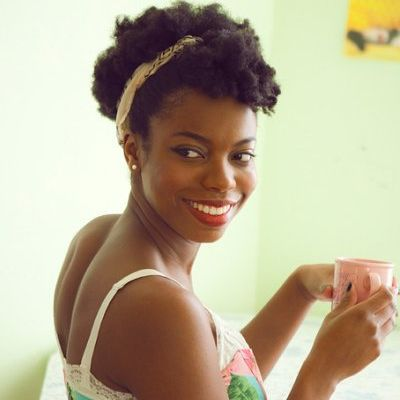It was the summer of 2004. I was a grad student with experience in resident life and I had taken on a job as co-director of a summer program hosted at my university. The pay was good and it gave me time to read and prep for my first go at teaching that fall.
At first, the job was cool and a nice break from my stay at home jobs I’ve had in the past. I was co-directing with one of my best friends and the high school kids I worked with were sweet. That is until my boss, a surly, hapless white man who spent most of his time avoiding work, decided to show out. We’d be at staff meetings and he would literally act as if I wasn’t there. He would look past me and pretend I wasn’t speaking. It was infuriating, disrespectful, and petty. I had suffered ill treatment for being a young Black woman before, but this took that experience to a whole other level.
To say that I was angry would be an understatement. This lazy fool refused to speak to me, actively obstructed my job, and was generally an asshole. And he thought he could get away with it because I was the one–the scapegoat, the garbage dump, the only sista in the room.
This happened almost 10 years ago, when I was a wee crunk feminist. But please believe I was crunk as hell. Trust. He didn’t break my spirit–in fact, with the help and support of my co-director, my friends, and loved ones, I finished out the summer with my coins, my sanity, and my spirit in tact.
I mention this story because I’ve been thinking about Sasheer Zamata, the latest cast member to join Saturday Night Live, which has been under fire for their lack of Black women comedians. (Remember the tragicomic skit with Kerry Washington where she had to act as every famous Negress there is, while SNL added some wacktastic disclaimer because “if we all joke about it it’s not racist, right? FOH)

Zamata has cut her teeth at the Upright Citizen’s Brigade and has had an otherwise promising career, so I hope she’ll do well. But, like so many women of color, having experienced being “the one” in the room can be a heavy burden and, sing it with me, “I’m Not Your Superwoman!”
While I am heartened by the news that Sasheer Zamata is going to be joined by two other sistas (LaKendra Tookes and Leslie Jones) who will start work as writers on the show next week, there is still cause for concern, especially considering the fact that she is only the fifth Black woman to join the cast and was only added after SNL was shamed into convinced to hold a casting call for Black women comedians and after ole trifling ass Kenan Thompson flapped his gums out of order. Brotha, go sit down and have a stadium of seats.

Let’s not even mention Don Lemon’s latest shenanigans.
Now, some of you may be thinking, “Girl, please. I don’t even watch SNL like that.” Well, me neither. I’ve never been a huge fan of the show. Back in the day, In Living Color and Mad TV were my go to shows in terms of sketch comedy. And, today, there are so many excellent web series (see Chescaleigh and really any of Issa Rae‘s productions), hilarious websites (Crunk & Disorderly is an old fave), and gutbusting podcasts (The Read–need I say more?) with Black women front and center, I’m not really studying SNL like that. I do think, though, that it’s important for Black women to have as many opportunities to live out their dreams. And I’m glad Sasheer Zamata is going to be on SNL for that reason alone.
Currently, I am the only openly queer black woman at my job. Well, I’m also the only openly queer woman and the only black person, period. And while I certainly am not experiencing the tomfoolery of 2004, being the only one can be, well, lonely.
I hope that Zamata knocks it out the park and makes me watch DVR SNL because she’s so fucking funny. I hope that in meetings and interviews folks don’t talk to her sideways, and when if they do, she takes a lesson from our sista Laverne Cox on how to get someone together right quick without even breaking a sweat (I’m talking to you, Katie Couric). I hope that soon when folks say, “Do you know Sasheer Zamata?” they respond, “Oh yeah, she’s the funniest one on SNL.”
What are your thoughts on the recent hires over at SNL? Will you be watching for Sasheer Zamata?

*nod nod nod* I haven’t watched SNL more than a handful of times in the last few years, but it’s still a very influential show (for better and worse) with a broad audience, so even if I have no plans to watch it any time soon, I’m very glad to see Ms. Zamata on the cast and Ms. Tookes and Ms. Jones in the writing room. SNL means they get a chance to get their voices out to the world. I wish them the best of luck.
good post. I, too, am eager for the fresh perspectives that Sasheer, LaKendra, and Leslie can potentially bring to SNL! I saw Sasheer at an event in NYC a couple months ago and she’s definitely got the chops. I’ve been a long-time fan of the show and slowly became conscious of the cast/writer’s narrow focus over the years. That Kerry Washington sketch was so fantastic to me and I thought, “hey, they’re waking up a bit!” So, you know, we’ll see what happens…chuggin’ along, little by little….
I don’t know ’bout SNL, but LaVerne Cox is dynamite. I loved what she said about genitals. I loved what she said about that kid that got killed in Harlem. LaVerne looked good too. Thanks for the rap about black women in authority (or black women in crunk), esp. in res. life.
LaVerne helped Carmen be better. LaVerne was quite smooth. T.V. is so hard.
Cheryl
Regular SNL watcher excited to have some intersectional diversity in the cast. I was equally excited when Kate McKinnon joined the cast as an open Lesbian and was definitely heartened to find out that SNL hired not one but three WoC–having the depth of representation stretch to the writer’s room can only be a good thing in my opinion
This doesn’t dovetail with your segue into SNL (which I only DVR and fastforward when the guest host interests me) unless we accept a broad definition of the term “programming,” but let’s see…
I have tried to program in my day. Here are the layers of awfulness that led to a public disaster disguised as a panel:
1) I’m unauthorized to do anything on my own;
2) the guy I must go through cycles between ignoring me, talking about himself or his partner, and either interviewing me for an unpaid internship or giving me a job performance review despite not being my boss, prospective or otherwise;
3) those who show up at the last minute or with minimal interpersonal preparations go nowhere fast;
4) those (like “the guy I must go through”) who didn’t help as promised and then didn’t show up let that happen.
How/Why:
*The monologuist is the source of aggressions both micro and macro.
*Monologuists can shift modes from macro to micro and back with ease to (re)classify you at their convenience into Threat, Token, Subordinate, Potted Plant, or Thin Air.
*The attitude of “it’s just a panel, folks show up and take turns giving monologues” is held precisely by habitual monologuists who only pay lip service to terms like “dialogue.”
The ultimate sticking point: Multiplying the ivory tower ideal of a spouting font of wisdom into a panel formation only proves that multiculturalism and the cult of expertise cancel each other out. (You better believe this is not MIT’s M.O.!)
Question for 2014: Is the much-vaunted feminist ideal of “the small group” really a panel, palmed off as a coffee klatch or tete-a-tete?
My way to connect back to sketch comedy shows is, I have read histories of SNL that present evidence of the original producers, stars and headwriters censoring female writers’ dialogic skits as “too slow/obscure/tangential/etc.” Is it possible that the skits I do enjoy skewer panel shows and chat shows because they target that monologic gold standard of programming?
See It’s Personal/Libby Wolfson (Andrea Martin) Meets Marilyn Denis http://www.youtube.com/watch?v=RLQPjX5_u64 for a fairly recent example. I found it amusing, but that may just be my taste.
I recall some of the best moments of SNL were monologues, but I later read that folks like Eddie Murphy and Danitra Vance (eulogized last year at http://splitsider.com/2013/01/saturday-nights-children-danitra-vance-1985-1986/ and elsewhere) would be thrown on when there was a dead spot because the producers knew they could fill it on the fly. What made them great is, they knew how to pass off a one-sided dialogue as a monologue. Now, that’s Drama.
I was so busy on Memory Lane I forgot to answer the questions! I’ve seen Sasheer Zamata once and it was the Black History Month insert. They gave her a chance to look lovely but not really to deliver a punch line, did they? My immediate reaction was, “Canned content? Are they just going to rerun this 4 times in a row and say, ‘Now we’re done’?” That doesn’t bode well, but I hate to be a wet blanket…